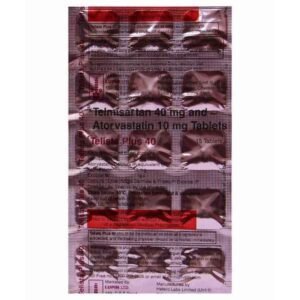ATORVASTATIN + TELMISARTAN
Atorvastatin: Atorvastatin is a drug classified as a statin, commonly known as a cholesterol-lowering medication. It is marketed under the brand name Lipitor.
Use:
Atorvastatin is primarily prescribed to lower high cholesterol levels and to reduce the risk of cardiovascular events such as heart attacks and strokes. It is prescribed to individuals with high levels of LDL cholesterol (also known as “bad” cholesterol) and triglycerides, and to those with low levels of HDL cholesterol (also known as “good” cholesterol).
Mechanism of Action:
Atorvastatin works by inhibiting an enzyme called HMG-CoA reductase, which is involved in cholesterol production in the liver. By suppressing this enzyme, Atorvastatin reduces the production of cholesterol, leading to lower LDL levels. It also modestly increases HDL cholesterol levels. Ultimately, these actions help to decrease the risk of cardiovascular events.
Dosage:
The dosage of Atorvastatin may vary depending on the individual’s condition and response. The usual starting dose is 10-20 mg per day, with the dose titrated based on cholesterol levels and the desired therapeutic effect. The maximum recommended dose is 80 mg per day.
Side Effects:
Common side effects of Atorvastatin include headache, stomach pain, muscle pain, diarrhea, and constipation. These side effects are usually mild and temporary. However, more serious side effects can occur, although they are rare. These include liver problems, muscle damage (rhabdomyolysis), and an increased risk of diabetes. It is important to monitor liver function and report any significant muscle pain or weakness to a healthcare professional. Additionally, Atorvastatin should be avoided in pregnant women or those planning to become pregnant, as it may harm the fetus.
Telmisartan: Telmisartan is a medication commonly used to treat high blood pressure (hypertension). It belongs to a class of drugs called angiotensin II receptor blockers (ARBs).
This drug works by blocking the action of angiotensin II, a hormone that causes blood vessels to constrict, leading to increased blood pressure. By blocking the effects of angiotensin II, Telmisartan helps relax and widen the blood vessels, thus lowering blood pressure.
The usual recommended dose of Telmisartan for hypertension is 20-80 mg taken orally once daily. However, the specific dosage may vary depending on the individual’s condition and response to treatment. It is important to follow the instructions provided by the healthcare provider or pharmacist to ensure proper dosing.
As with any medication, Telmisartan may have potential side effects. The common side effects reported include dizziness, headache, tiredness, back pain, stomach pain, diarrhea, and upper respiratory tract infection. It is important to note that not everyone will experience these side effects, and some individuals may have no side effects at all. If any side effects persist or worsen, it is essential to consult a healthcare professional.
In rare cases, Telmisartan may cause more serious side effects such as allergic reactions, difficulty breathing, chest pain, irregular heartbeat, and swelling of the face, lips, or tongue. If any of these severe side effects occur, immediate medical attention should be sought.
Telmisartan may also interact with other medications, so it is crucial to inform the healthcare provider about all current medications, including prescription, over-the-counter drugs, and herbal supplements, before starting Telmisartan.
Overall, Telmisartan is a widely prescribed medication for hypertension management. It is important to use it as directed and follow up with regular check-ups to monitor its effectiveness and minimize potential side effects.

